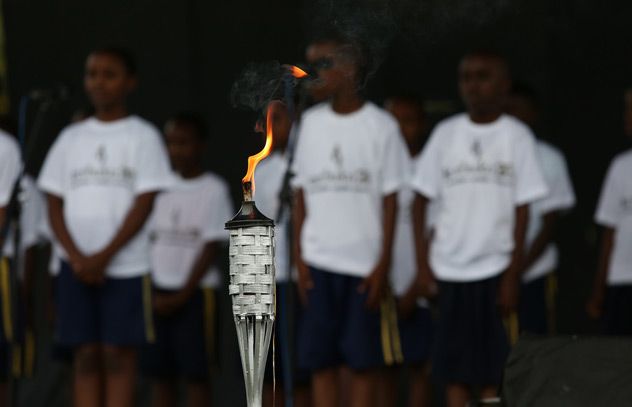

Credit: www.kwibuka.rw
Update
Twenty years on, Rwanda remembers the victims of the genocide
07 April 2014
07 April 2014 07 April 2014United Nations Secretary-General Ban Ki-moon and UNAIDS Executive Director Michel Sidibé on 7 April joined President Paul Kagame and First Lady Jeannette Kagame, African leaders, representatives of the international community and the people of Rwanda to light the national flame of mourning. The flame will continue to burn for the next 100 days at the Kigali Genocide Memorial Centre to honour the victims of the genocide.
Since 1994, Rwanda, together with the international community, has made remarkable progress in bringing the perpetrators of the genocide to justice and rebuilding a peaceful, healthy and productive nation through an equitable health and development strategy.
Extensive sexual violence against women and girls during the 100 days of the massacre left many female Rwandan genocide survivors infected with HIV. However, over the past 20 years, Rwanda has made significant efforts to scale up the national AIDS response. In 2012, an estimated 210 000 people were living with HIV in Rwanda and 81% of the people who were eligible for HIV treatment under the World Health Organization’s 2013 guidelines had access to antiretroviral therapy. New HIV infections in Rwanda declined by 54% between 2001 and 2012, from 17 000 to 7 800, while AIDS-related deaths decreased sharply, from 23 000 to 5 600, within the same period. Rwanda is on the right track to ensure universal access to HIV prevention, treatment, care and support services.
Quotes
“We honour their lives through remembrance and reflection, but also through doing everything that we can to improve protection, response and safeguarding populations from genocide and other atrocities. We stick together—we stay together. That is our pledge to Rwanda and the world.”
“We did not need to experience genocide to become a better people. It simply should never have happened. No country, in Africa or anywhere else, ever needs to become another Rwanda. But if a people’s choices are not informed by historical clarity, the danger is ever present.”
“We are here today to reflect on one of the darkest periods in our history, when almost a million Rwandan people lost their lives and thousands more suffered brutal mutilation and rape. We are also here to show that we stand in solidarity with the government and the people of Rwanda to build an economically and socially powerful country that is fair and safe for all.”



